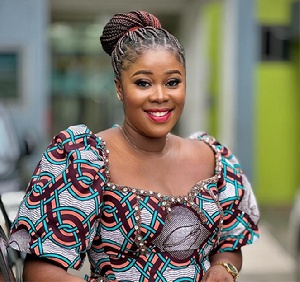- Home - Entertainment
- Lifestyle News
- Year In Review
- Music News
- Entertainers
- Entertainment Archive
- Entertainment Photos
- Jokes
- Entertainment Headlines
- Ameyaw Debrah
- Brown GH
- Celebrities Buzz
- GH Base
- Ghana Celebrities
- Gh Gossip
- GH Page
- GH Splash
- Hot Gossip GH
- YEN
Entertainment of Wednesday, 7 May 2025
Source: www.ghanawebbers.com
Feature: Growing Ghana’s Creative Industry: Learning from the Nigerian Playbook
Frema Adunyame, the Author
Over the past decade, Nigeria’s creative industry has become a global powerhouse. This is especially true for music and film. Grammy-nominated Afrobeats stars and Nollywood films are now on global streaming platforms. Nigeria's cultural exports have captivated audiences worldwide. Their success comes from a structured approach to building a creative economy.
Nigeria’s music industry, particularly Afrobeats, has grown significantly. What started as a regional genre is now streamed globally. It plays in top clubs and features in major festivals. This rise is due to strategic efforts by artists and government institutions.
Nollywood, Nigeria’s film industry, is now the second-largest in volume worldwide. It produces over 2,500 films annually. From humble beginnings in the early 1990s, it has become a multi-billion-dollar sector. In 2021 alone, Nollywood employed around 300,000 people according to Business Day Nigeria estimates.
Deliberate steps led to this success. Movies resonate with local audiences through relatable storylines and African faces. They address themes like family and politics while using indigenous languages for mass appeal.
Ghana also has rich cultural heritage but lacks sustained momentum in creativity. We need to learn from our neighbors—not just copy them but adopt effective strategies for ourselves.
Match Policy with Purposeful Investment
One key driver of Nigeria’s creative boom is financial investment backed by government initiatives. Public policy began supporting Nollywood late but effectively through funds like Project ACT Nollywood Fund.
This fund offers grants for production and capacity building. The National Film and Video Censors Board (NFVCB) regulates content standards to improve quality. The Nigerian Creative Industry Development Bill aims to formalize entertainment sector funding.
For Ghana's entertainment industry to grow globally, government support must be practical and deliberate. Arts are not cheap; producing quality films can cost hundreds of thousands of dollars.
Ghana needs a Creative Industries Fund to support creators across sectors like film and music. Tax incentives should attract private investments into the creative space.
Build the Right Infrastructure
Ghanaian creators often lack access to necessary tools for high-quality work. We need well-equipped creative hubs with studios and performance spaces.
Accra, Kumasi, and Takoradi could become creative corridors through public-private partnerships focused on infrastructure development in the arts.
Currently, the National Theatre is Ghana's only ideal venue for live performances but is in poor condition with outdated equipment.
Infrastructural development should start with institutions meant for training creatives—like completing the Arts Complex at the University of Ghana after over 15 years of construction delays.
Develop and Protect Talent
While Ghana has immense talent, structured support for growth is lacking due to perceptions about arts careers. We must integrate creative arts into education from primary schools onward.
Partnerships with global institutions can provide mentorship opportunities for students pursuing careers in music or acting right after school under national service programs.
In Nigeria, platforms like Mavin Records create professional structures for talent grooming and distribution globally through strategic collaborations with international artists.
Ghanaian musicians have had some success internationally but need more deliberate efforts toward collaboration with global artists as well as enforcement of intellectual property rights to protect their work.
Go Digital—Globally
Nigerian artists excel at using digital platforms effectively; Ghanaians must learn this too. Creators need training on digital algorithms and viral marketing strategies while maintaining authenticity in their content creation aimed at global audiences.
Nigerian artists leverage platforms like YouTube and Spotify aggressively; they accounted for 66% of sub-Saharan Africa’s total music streaming revenue in 2022 according to IFPI reports.
Songs like CKay’s “Love Nwantiti” became global hits largely due to TikTok trends while Nigerian film companies gained international recognition through digital access via Netflix since 2015.
Ghana must create more successful artists who can flood digital spaces with local content that represents us globally—think Stonebwoy or Sarkodie among others!
Promote National Pride in the Arts
To grow our creative industry further we must shift mindsets about arts careers being legitimate professions rather than mere pastimes or hobbies that deserve respect from families or society at large!
Nigeria uses Nollywood effectively as a tool promoting its stories globally; similar campaigns celebrating Ghanaian arts can foster an environment supportive of our creatives’ endeavors too!
We have notable figures who’ve risen high within society despite coming from artistic backgrounds—these examples can help change negative perceptions surrounding pursuing careers within this field!
Define a Ghanaian Creative Identity
Just as Afrobeats became Nigeria's identity worldwide so too can Ghana build its distinct brand rooted deeply within unique rhythms & storytelling traditions!
Our “December in GH” campaign serves as an excellent platform worth expanding upon further showcasing culture & fostering international collaborations positioning us firmly within West Africa's cultural capital landscape!
Authenticity remains crucial when appealing both home & abroad; incorporating local languages alongside traditional rhythms creates exportable products reflecting true identities!
Highlife Music deserves protection & development—it’s part of our heritage! Young musicians should infuse it into their works instead of mimicking others' sounds which dilutes originality!
We need initiatives reviving interest towards Highlife Music such as festivals celebrating its legacy while encouraging new talents embracing these roots wholeheartedly moving forward together collectively towards greatness ahead!
In Summary
Creative success requires vision commitment along strategic investments made consistently over time!
Ghana must prioritize supporting its creative sector not just verbally but materially respecting artistry equally alongside other industries deemed important!
The time for action is now—governments should take these matters seriously beyond mere campaign promises recognizing how vital creativity truly stands out amongst all sectors today!
Only Ghanaians can tell authentic stories about themselves best—our music & storytelling traditions remind us where we came from inspiring future generations towards achieving even greater heights together unitedly shining brightly across borders!











